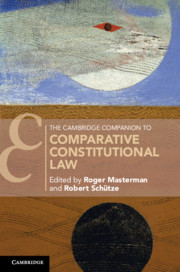Book contents
- Reviews
- The Cambridge Companion to Comparative Constitutional Law
- Cambridge Companions to Law
- The Cambridge Companion toComparative Constitutional Law
- Copyright page
- Contents
- Notes on Contributors
- Acknowledgements
- Table of Cases (Selection)
- Abbreviations
- Introduction
- Part I Theoretical Foundations
- Part II Historical Experiences
- 3 The United Kingdom Constitution
- 4 French Constitutional Law
- 5 US Constitutional Law and History
- 6 The Constitution of the Republic of India
- 7 The Constitution of China
- Part III Constitutional Principles
- Part IV State Institutions
- Part V Transnational Constitutionalism
- Index
- References
3 - The United Kingdom Constitution
from Part II - Historical Experiences
Published online by Cambridge University Press: 30 September 2019
- Reviews
- The Cambridge Companion to Comparative Constitutional Law
- Cambridge Companions to Law
- The Cambridge Companion toComparative Constitutional Law
- Copyright page
- Contents
- Notes on Contributors
- Acknowledgements
- Table of Cases (Selection)
- Abbreviations
- Introduction
- Part I Theoretical Foundations
- Part II Historical Experiences
- 3 The United Kingdom Constitution
- 4 French Constitutional Law
- 5 US Constitutional Law and History
- 6 The Constitution of the Republic of India
- 7 The Constitution of China
- Part III Constitutional Principles
- Part IV State Institutions
- Part V Transnational Constitutionalism
- Index
- References
Summary
‘In law context is everything.’ So said Lord Steyn in the case of R (Daly) v. Secretary of State for the Home Department.1 In doing so, he was perhaps making a statement of the blindingly obvious, but that does not undermine either the veracity or the broad pertinence of the observation. Indeed, it is an insight onto which the comparative lawyer in particular, and perhaps the comparative constitutional lawyer even more especially, must fasten. One of the great virtues of comparative study is its capacity to illuminate one’s comprehension of a given legal phenomenon or system through an appreciation of how and why things are done differently elsewhere. Understanding why such differences arise can illuminate one’s ‘home’ jurisdiction in fresh ways, subtly, or even radically, changing one’s perspective, and opening up new avenues of inquiry. This can be particularly instructive when the jurisdictions under consideration are, in general, relatively similar – for in such circumstances, individual points of contrast are not readily dismissible as functions of macro-divergence. It is for this reason that comparative scholarship that examines different members of a jurisdictional family, such as the common law systems that form the focus of this book, can be so fruitful.
- Type
- Chapter
- Information
- Publisher: Cambridge University PressPrint publication year: 2019



